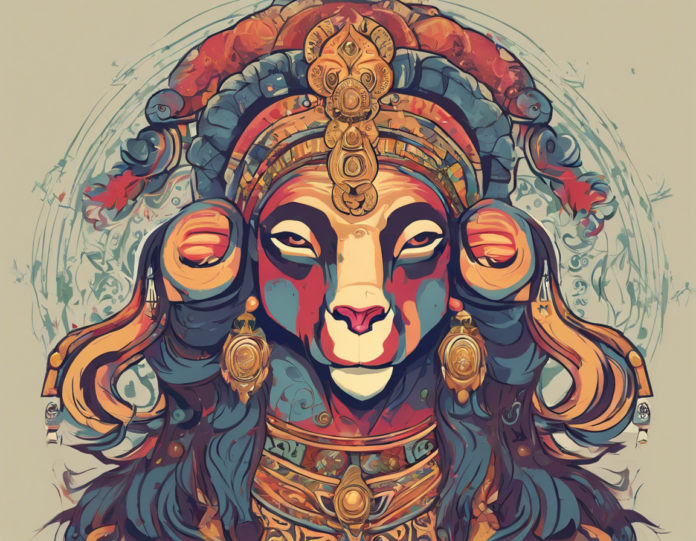The Legend of Ram Lalla
In the heart of Ayodhya, a sacred city in Uttar Pradesh, India, lies the revered site known as the Ram Janmabhoomi, where it is believed that Lord Ram, the seventh avatar of the Hindu god Vishnu, was born millennia ago. Central to the Ram Janmabhoomi is the deity of Ram Lalla, which translates to "Baby Ram" or "Divine Child Ram". This sacred representation of Lord Ram as an infant is worshipped with immense devotion by millions of Hindus worldwide.
The Iconography of Ram Lalla
Ram Lalla is depicted as a charming and endearing child, often shown crawling on all fours, adorned with princely garments and divine ornaments. With a serene expression on his face, Ram Lalla exudes an aura of innocence and purity, captivating the hearts of devotees who flock to offer their prayers and seek his blessings.
Devotion and Beliefs
Devotees believe that Ram Lalla embodies the divine essence of Lord Ram, the epitome of righteousness and virtue. Worshipping Ram Lalla is believed to bestow blessings of peace, prosperity, and protection upon the devotees. Many parents also pray to Ram Lalla for the well-being and protection of their own children, seeking his divine grace in nurturing them with love and virtue.
The Ram Janmabhoomi Dispute
The Ram Janmabhoomi site has been at the center of a contentious legal and political dispute for decades. The dispute primarily revolves around the ownership and control of the land where the Babri Masjid, a mosque built in the 16th century, once stood. In 1992, the mosque was demolished by Hindu extremists, sparking communal riots across India.
Legal Recognition of Ram Lalla
In a landmark judgment in November 2019, the Supreme Court of India ruled in favor of the construction of a Ram temple at the disputed site while also directing the government to allocate an alternative plot of land for the construction of a mosque. The court recognized the deity of Ram Lalla as a legal entity and granted the Hindu parties control over the disputed land, paving the way for the construction of the Ram temple.
Devotional Practices
Devotees of Ram Lalla engage in a range of devotional practices to express their reverence and seek his blessings. Some common rituals include daily prayers, offerings of flowers, incense, and sweets, singing devotional hymns and songs in praise of Lord Ram, and observing fasts on auspicious days dedicated to the deity.
Significance of Ram Lalla
Ram Lalla symbolizes the divine presence of Lord Ram in his most tender and innocent form, emphasizing the virtues of humility, innocence, and purity. The deity serves as a spiritual beacon guiding devotees on the path of righteousness, compassion, and devotion. Worshipping Ram Lalla is believed to foster inner peace, spiritual growth, and a deep connection with the divine.
FAQs
-
Who is Ram Lalla?
Ram Lalla is the infant form of Lord Ram, the revered Hindu deity known for his righteousness and valor. Devotees worship Ram Lalla as a divine child king with immense love and devotion. -
What is the significance of Ram Lalla in Hindu mythology?
In Hindu mythology, Ram Lalla symbolizes the essence of Lord Ram's divinity in his formative years, highlighting the virtues of innocence, purity, and divine grace. -
How do devotees worship Ram Lalla?
Devotees worship Ram Lalla through daily prayers, offerings of flowers and sweets, chanting of hymns, and observing fasts on auspicious occasions dedicated to Lord Ram. -
What is the Ram Janmabhoomi dispute?
The Ram Janmabhoomi dispute pertains to the ownership and control of the land in Ayodhya where the Babri Masjid once stood. The dispute has been a longstanding issue with religious and political ramifications. -
Why is Ram Lalla considered a legal entity by the Supreme Court of India?
The Supreme Court of India recognized Ram Lalla as a legal entity in the context of the Ram Janmabhoomi dispute to establish the deity's rights and interests in the disputed land. -
What virtues does Ram Lalla embody?
Ram Lalla embodies virtues such as humility, innocence, purity, and divine grace, serving as a spiritual guide and source of inspiration for devotees seeking spiritual growth and inner peace. -
What does worshipping Ram Lalla entail?
Worshipping Ram Lalla involves expressing devotion through rituals, prayers, offerings, and acts of piety aimed at seeking the blessings and protection of the divine child king. -
How does Ram Lalla inspire devotion among his followers?
Ram Lalla inspires devotion among his followers through his endearing charm, benevolent presence, and the timeless teachings of Lord Ram that emphasize righteousness, compassion, and devotion. -
What role does Ram Lalla play in the lives of devotees?
Ram Lalla plays a pivotal role in the lives of devotees by offering spiritual guidance, protection, and blessings, fostering a deep sense of connection with the divine and enriching their spiritual journey. -
How does the worship of Ram Lalla contribute to inner transformation?
The worship of Ram Lalla encourages devotees to cultivate virtues of love, compassion, and humility, leading to inner transformation, spiritual elevation, and a closer bond with the divine presence of Lord Ram.


Recent comments